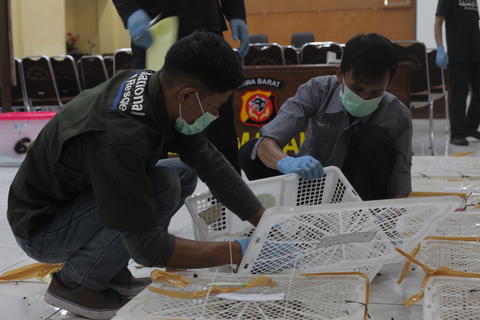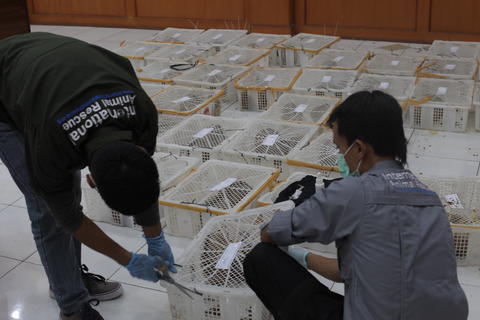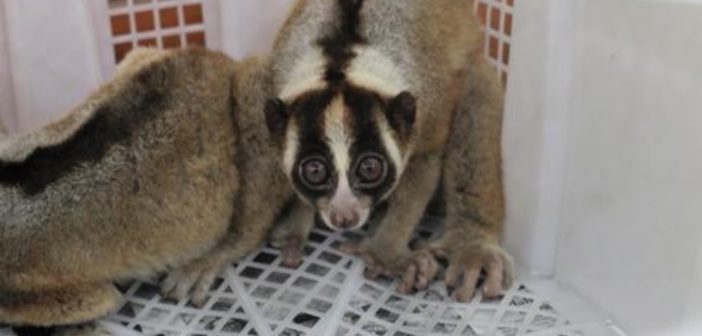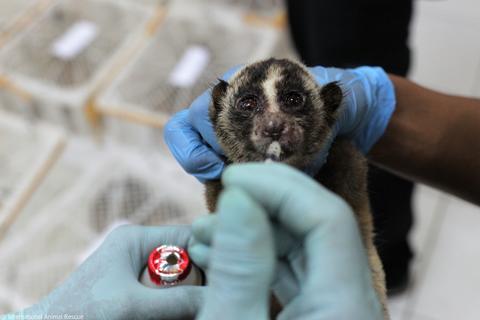Ten critically endangered Javan slow lorises are in intensive care at the International Animal Rescue (IAR) primate center near Bogor, West Java after being confiscated from poachers by the Majalengka Regional Police. The lorises had been rescued from the illegal trade in the Majalengka area, West Java and were taken to our center on January 12.
“We have been working with the West Java Regional Office of the Forestry Department (BKSDA) to help treat the confiscated animals. Since Thursday morning, we have been working hard doing initial medical check-ups at the Majalengka Police Station and at the BKSDA in Cirebon,” said Wendi Prameswari, IAR Indonesia’s Animal Care Manager.
She explained that, based on the examination, ten slow lorises were identified as being in need of further treatment at the rehabilitation center, while the rest could undergo treatment at the Cirebon BKSDA with the recommendation that they should subsequently be released immediately back into their habitat.
 “We brought ten of the slow lorises back to our rehabilitation center to undergo further medical examinations and treatment for their injuries and their poor condition,” she continued.
“We brought ten of the slow lorises back to our rehabilitation center to undergo further medical examinations and treatment for their injuries and their poor condition,” she continued.
Results of the medical examinations carried out at the center since Saturday confirm that the lorises are suffering from a number of problems. These include trauma, intestinal worms, infected teeth and gums, diarrhea and wounds to the body.
“This type of poor condition is commonly found in slow lorises that have suffered mistreatment from hunting and trading activities. In fact, it is not uncommon for lorises to die from stress, dehydration, and malnutrition as a result of being kept and transported in cramped, dirty boxes, “said Wendi .
She added that four of the 79 slow lorises had died. “It is estimated that around 30 percent of lorises die during the wildlife trafficking process, which involves being hunted and captured, stowed away and sent to traders to be sold, both conventionally and online, ” said Wendi.
The ten slow lorises will be kept under close observation by our medical team. They will monitor the primates’ physical condition and administer drugs and vitamins to aid their recovery.
“They will undergo a series of medical examinations and disease screening procedures in accordance with our quarantine protocols and animal welfare principles. Only once they have been given a clean bill of health will they be ready to enter the rehabilitation phase, ” said Wendi. She added that it requires considerable time, effort and expense to restore the health of lorises that have been victims of hunting and trade. In general, their physical condition is poor and their natural behavior is adversely affected.
“It will still be possible to return all the lorises confiscated by Majalengka District Police to their natural habitat, apart from Sepulu who is receiving intensive care. We are currently working to restore the psychological condition of this loris which has suffered badly from being packed and transported in a small crate. Once he has recovered, he will also be recommended for release,” she said.
 Following up on the results of the prosecution of the Majalengka Regional Police, IAR Indonesia is committed to supporting efforts to save these confiscated slow lorises and return them to the wild, as well as working with law enforcement and the West Java. “We applaud the prosecution action taken by the Majalengka Regional Police. This case shows that the threat of trade in protected animals must be dealt with more decisively. The judicial process can act as a deterrent by awarding a maximum sentence to the perpetrators,” said Tantyo Bangun, Chairman of IAR Indonesia.
Following up on the results of the prosecution of the Majalengka Regional Police, IAR Indonesia is committed to supporting efforts to save these confiscated slow lorises and return them to the wild, as well as working with law enforcement and the West Java. “We applaud the prosecution action taken by the Majalengka Regional Police. This case shows that the threat of trade in protected animals must be dealt with more decisively. The judicial process can act as a deterrent by awarding a maximum sentence to the perpetrators,” said Tantyo Bangun, Chairman of IAR Indonesia.
In line with Tantyo Bangun, our Program Director in Indonesia, Karmele Llano Sanchez also expressed her appreciation of the police in Majalengka and also of the local community who provided information on illegal wildlife trade. “We really appreciate the commitment of the Polres (Police) and the local people, and we are very encouraged to see that the slow loris trade in Indonesia is no longer tolerated, either by the police, other law enforcement officials, or by the community. We all say NO to the illegal trade in wildlife!”
Featured image: The fearful lorises arrive at the primate center. Image credit for this image and all images in this story to International Animal Rescue.






